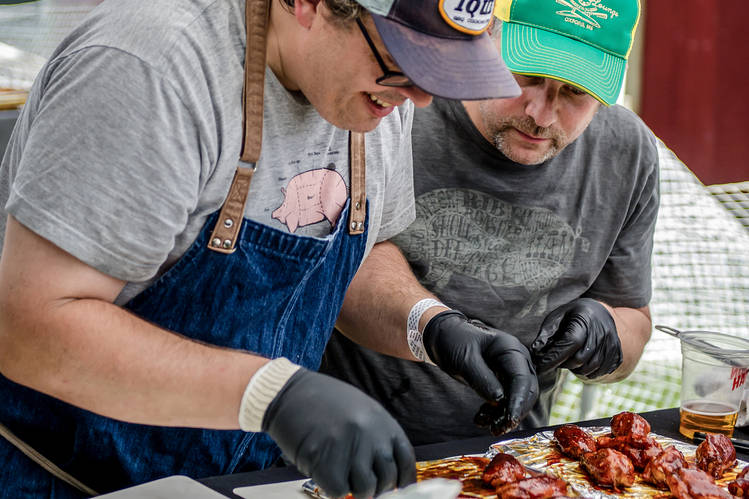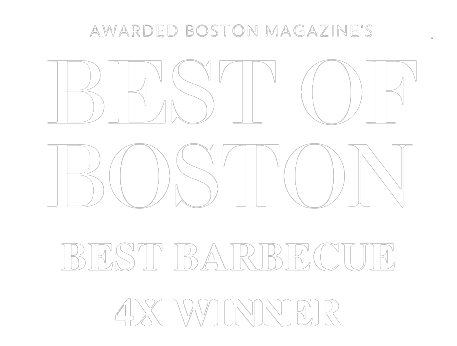The Yankees Who Brought Science to the BBQ World

from Wall Street Journal | by Ben Mezrich
A software engineer and a chef took on venerable Southern competitions—and won, making history with the help of ’meat glue’ and the ‘frankengrill’
When you think barbecue, the locales that come to mind probably don’t include Windsor, Vt. But for the thousands of enthusiasts who descended on this hilly, wooded enclave on the banks of the Connecticut River in late July for the 18th annual Harpoon Brewery Barbecue Festival, this slice of rural New England is central to what barbecue has become: a national pastime, reaching beyond its celebrated Southern origins.
Two leading characters in this shift have been the team of Boston chef Andy Husbands and pitmaster Chris Hart. They’ve participated in the festival every year since its launch, but their claim to fame in the BBQ world goes beyond bridging the divide between North and South: They’ve also been pioneers in bringing science to the fine art of slowly smoking delectably fatty meats.
Competition BBQ began in the South. The Kansas City Barbecue Society, the largest competition league in the country, was founded in 1985, alongside a newsletter tracking local backyard competitions. It has since grown to include over 20,000 members, who take part in 450 official competitions, culminating in the Kansas City Royal, held on a Nascar racetrack on Labor Day each year. The Jack Daniel’s World Championship Invitational Barbecue, based at the Jack Daniel’s distillery in Lynchburg, Tenn., brings together 90 international teams plying their trade in front of 25,000 fans.
“The Jack and the Royal—they’re the Super Bowl and the World Series of BBQ,” said Mr. Hart, fresh from the competition in Vermont. “You don’t have anything like that in New England. But the real question has become, is there great BBQ in the North? And the answer, more and more, is yes.”
Over the past two decades, Mr. Hart and Mr. Husbands and their IQUE team have been crowned Grand Champion at over 30 competitive BBQ events across the country. More impressive, they were the first team from north of the Mason-Dixon Line to take first place in an event at the Royal and to win the title of Grand Champion at the Jack.
“Southern BBQ is regionally focused,” Mr. Hart continues. “Some pitmasters in Eastern North Carolina only cook whole hogs with a specific sauce. In Texas Hill Country, some cook beef with salt and pepper, because it’s been cooked that way for a hundred years.” “We don’t have these traditions,” Mr. Husbands adds, “so for better or worse, we have a wide range of styles.”
Their first foray into competition BBQ was in October 1999 at an event called the Pig’N’Pepper Fest in Westford, Mass. Best friends since high school, Mr. Husbands was by then a top chef in Boston, and Mr. Hart was a software engineer and quality-assurance scientist in the city’s Route 128 tech corridor. They arrived armed with a Smokey Joe Smoker—the sort of device you’d find on the shelf at Home Depot —and felt sure they could take home a prize. Instead, their ribs, pork and brisket all landed in last place. But they were hooked.
Mr. Hart spent the next weekend building a barbecue lab in his driveway, with computers arranged to keep track of the variables involved in creating perfect smoked meat: fire temperature, air temperature, flipping, turning. Day after day, he cooked, took down the numbers and then cooked again.
He also began to peruse internet discussion boards. It was on one of these boards, “The Smoke Ring,” that he befriended a former food scientist named Joe Ames. Ames had been developing an injection made up of phosphates, hydrolytes, nitrates, bouillons and other umami flavors. He called his injection FAB (food additive barbecue), and it could be tailored for pork, beef or chicken. Mr. Hart discovered that the injection acted as a binding agent at the molecular level, allowing meat to keep its integrity and moisture and giving it extraordinary tenderness.
Around the same time, Mr. Husbands began experimenting with an enzyme called transglutaminase, which people in the food industry call “meat glue” (some restaurants use it to meld together, say, two cheap four-ounce cuts of beef tenderloin to make a more expensive 8-ounce filet). To his delight, he found that the enzyme could also bond chicken skin in place, to ensure a perfect bite.
A third innovation came by accident: While traveling to a BBQ competition in Maryland, the partners spent the weekend cooking and talking with an enthusiast nicknamed “Shotgun Fred.” It turned out that Fred Pirkle (his real name) was a brilliant engineer who had founded a company called BBQ Guru. He’d created a complex system, integrating a fan with a computer’s CPU (central processing unit), and it could be attached to a smoker. The fan stoked the smoker’s fire, slowing down or speeding up depending on the temperatures the CPU was reading from the ambient air.
This “frankengrill,” as they called it, looked like one of Doc’s crazy contraptions from the movie “Back to the Future”—wires and aluminum and a whirring fan blade—but it could maintain pinpoint perfect smoker temperatures for 14 hours or more.
Though molecular food science and technical innovations such as the computerized smoker had been floating around for some time on the margins of the barbecue world, Mr. Hart and Mr. Husbands knew that very few people had attempted to use these tools in competition. Here, they thought, was a chance to attempt a scientific “hack” of the age-old tradition. In the winter of 2002, they launched what became a revolution in barbecue.
Within months, their team had taken the northeastern BBQ community by storm, winning nearly every competition they entered. Their innovations were controversial. Many traditional pitmasters considered what they were doing akin to blasphemy. But their results were unassailable: IQUE was arriving at events with techniques and ingredients that nobody else had, and they were dominating.
After destroying their regional rivals, Mr. Hart and Mr. Husbands headed south, towing their frankengrill and enough meat to open a restaurant. And there they made BBQ history. In the decade since their big victory at the Jack in 2009, the techniques and ingredients they pioneered have become ubiquitous in the BBQ scene.
Hitting the Harpoon Barbecue Competition in Vermont this year, Mr. Hart and Mr. Husbands were old-timers, toting families along with their frankengrill. Their tents were stuffed with children’s toys and toddler-sized sleeping bags.
But they were still competitors. Their skills won them Grand Champion in grilling, first place in chicken and third place in BBQ overall. “It might not be the same as winning at the Jack,” Mr. Husbands mused, “but of all the events we’ve done, this one feels like home.”

